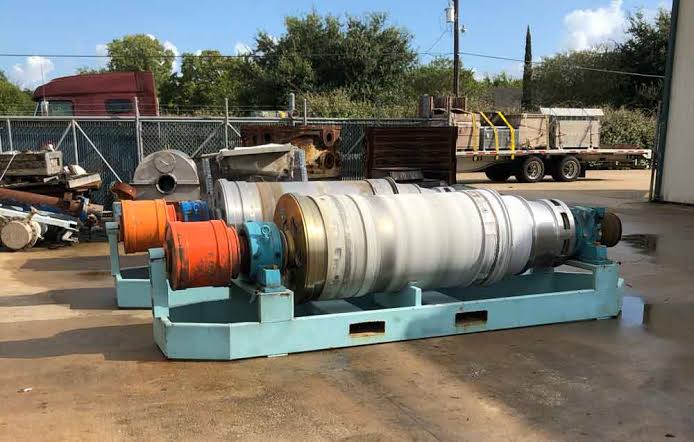A decanter centrifuge is an essential piece of equipment in various industries, known for its efficiency in separating solid particles from liquids. This technology has revolutionized processes in sectors such as wastewater treatment, oil and gas, food and beverage, and chemical production. In this article, we will explore the workings, applications, benefits, and maintenance of decanter centrifuges, with a special mention of zkcentrifuge.com, a leading provider in this field.
How Decanter Centrifuges Work
Decanter centrifuges operate on the principle of centrifugal force to separate different phases within a mixture. The mixture is fed into a rotating bowl, where high-speed rotation generates a strong centrifugal force. This force causes the denser solid particles to move outward and settle against the bowl wall, while the less dense liquid phase forms a concentric inner layer. A screw conveyor inside the bowl continuously moves the settled solids toward the discharge end, allowing the separated liquid to overflow from the opposite end. The effectiveness of a decanter centrifuge depends on various factors, including the rotational speed, bowl design, and the properties of the mixture being processed. Adjustments in these parameters can optimize the separation process for different applications.
Applications of Decanter Centrifuges
In wastewater treatment plants, decanter centrifuges play a crucial role in dewatering sludge. By removing excess water from the sludge, these machines reduce the volume of waste, making disposal more manageable and cost-effective. The high efficiency of decanter centrifuges in separating solids from liquids helps in achieving stringent environmental standards for wastewater discharge.
Oil and Gas Industry
In the oil and gas sector, decanter centrifuges are employed for drilling mud treatment. They separate the drilling fluids from solid cuttings, allowing the fluids to be recycled and reused. This process not only reduces the environmental impact of drilling operations but also cuts down on the costs associated with fluid disposal and new fluid preparation.
Food and Beverage Industry
Decanter centrifuges are integral to the food and beverage industry for clarifying liquids and recovering valuable solids. In wine production, for instance, they help in separating grape solids from the juice, resulting in clearer wine. Similarly, in the production of fruit juices, these centrifuges remove pulp and other solids to deliver a high-quality final product.
Chemical Industry
In chemical manufacturing, decanter centrifuges are used to separate fine chemical particles from liquid mixtures. This separation is critical for producing pure chemical compounds and ensuring the consistency and quality of the final products. The ability to handle a wide range of chemical compositions makes decanter centrifuges indispensable in this sector.
Efficiency
Decanter centrifuges offer high separation efficiency, capable of processing large volumes of mixtures quickly. This efficiency translates to increased productivity and reduced operational costs for businesses.
Versatility
These machines can handle a wide variety of mixtures with different properties, making them suitable for diverse applications. The ability to adjust operational parameters allows for customization to meet specific separation requirements.
Automation
Modern decanter centrifuges come equipped with advanced control systems that enable automated operation. This automation reduces the need for manual intervention, minimizes human error, and ensures consistent performance.
Environmental Impact
By effectively separating solids from liquids, decanter centrifuges contribute to environmental sustainability. They reduce the volume of waste generated, facilitate the recycling of valuable fluids, and help industries comply with environmental regulations.
Maintenance and Care
To ensure the optimal performance and longevity of decanter centrifuges, regular maintenance is essential. Key maintenance practices include:
Routine Inspections
Regular inspections help in identifying wear and tear on critical components such as the bowl, conveyor, and bearings. Early detection of issues can prevent major breakdowns and costly repairs.
Lubrication
Proper lubrication of moving parts is crucial for smooth operation. Using the recommended lubricants and following the manufacturer’s guidelines can extend the lifespan of the machine.
Cleaning
Keeping the centrifuge clean, especially the bowl and conveyor, prevents the buildup of residues that can affect performance. Regular cleaning schedules should be established based on the nature of the processed mixtures.
Component Replacement
Over time, certain components may need replacement due to wear. Using genuine parts from reliable suppliers like zkcentrifuge.com ensures compatibility and maintains the efficiency of the centrifuge.
Final Words
Decanter centrifuges are indispensable tools in modern industrial processes, offering efficient and reliable separation of solids from liquids. Their versatility, efficiency, and environmental benefits make them valuable assets in various sectors, from wastewater treatment to food production. Proper maintenance and care are essential to maximizing their performance and longevity. For high-quality decanter centrifuges and reliable components, zkcentrifuge.com is a trusted source in the industry.

